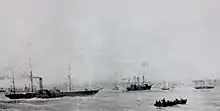.JPG.webp) Mona's Queen. | |
| History | |
|---|---|
| Name | Mona's Queen |
| Owner | 1853–1880: IOMSPCo |
| Operator | 1853–1880: IOMSPCo |
| Port of registry | Douglas, Isle of Man |
| Builder | J. and G. Thomson of Clydebank[1] |
| Cost | No official record, thought to be in the region of £14,000. |
| Yard number | 6[1] |
| Laid down | 1852 |
| Launched | 27 November 1852 |
| Completed | 1853 |
| In service | February 1853 |
| Out of service | 1880 |
| Identification |
|
| Fate | Scrapped 1880 |
| General characteristics | |
| Tonnage | 600 GRT |
| Length | Initially 170 ft 0 in (51.8 m) lengthened to 186 ft 0 in (56.7 m) following refit. |
| Beam | 27 ft 0 in (8.2 m) |
| Depth | 13 ft (4.0 m) |
| Propulsion | Side Lever Engine |
| Speed | 13 knots (24 km/h; 15 mph) |
SS (RMS) Mona's Queen (I) No. 21930 – the first vessel in the Company's history to bear the name – was an iron paddle-steamer which was owned and operated by the Isle of Man Steam Packet Company.
Construction and dimensions
Mona's Queen was built and engined by J. & G. Thomson of Govan, Glasgow and launched in 1852. She had a registered tonnage of 600 tons; length 186'; beam 27' and depth 13'. Her speed is recorded as 13 knots (24 km/h; 15 mph), and her horsepower is not recorded.[1]
Mona's Queen carried a figurehead of Queen Victoria, and was the first vessel to break away from the Company's long association with Robert Napier & Co. The vessel's cost is not recorded, but a reference in the Company's old minute book suggests it was under £14,000. In 1855 she was lengthened (details not recorded) at a cost of £2,111.
Service life
Mona's Queen appears to have had a pretty uneventful career, with the exception of a collision with the steamer Sligo, which occurred in the River Mersey in January 1862. The official inquiry went against the Steam Packet Company who had to pay approximately £300 in damages and costs. The Captain was accordingly reduced from Second Class Master to Third, and his pay was cut from £275 to £250.
Disposal
After ten years service the directors decided to sell the ship and offered it to Cunard, Wilson and Co. for £20,000.
The offer was declined, and negotiations started with a Whitehaven company for a sale at £14,000.
Midway through 1864 the directors admitted they could not sell the vessel. Mona's Queen therefore continued in the Company's service until she was broken up in 1880.
References
- Bibliography
- Chappell, Connery (1980). Island Lifeline T.Stephenson & Sons Ltd ISBN 0-901314-20-X
..JPG.webp)


